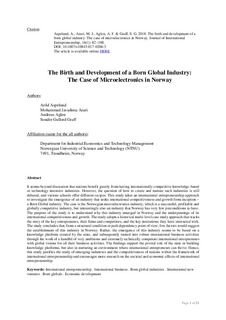| dc.contributor.author | Aspelund, Arild | |
| dc.contributor.author | Azari, Mohammad Javadinia | |
| dc.contributor.author | Aglen, Andreas Flåt | |
| dc.contributor.author | Graff, Sondre Gullord | |
| dc.date.accessioned | 2018-04-16T11:35:25Z | |
| dc.date.available | 2018-04-16T11:35:25Z | |
| dc.date.created | 2017-09-04T10:13:21Z | |
| dc.date.issued | 2017 | |
| dc.identifier.citation | Journal of International Entrepreneurship. 2017, 1-27. | nb_NO |
| dc.identifier.issn | 1570-7385 | |
| dc.identifier.uri | http://hdl.handle.net/11250/2494225 | |
| dc.description.abstract | It seems beyond discussion that nations benefit greatly from having internationally competitive knowledge-based or technology-intensive industries. However, the question of how to create and nurture such industries is still debated, and various schools offer different recipes. This study takes an international entrepreneurship approach to investigate the emergence of an industry that seeks international competitiveness and growth from inception—a born global industry. The case is the Norwegian microelectronics industry, which is a successful, profitable, and globally competitive industry, but interestingly also an industry that Norway has very few preconditions to have. The purpose of the study is to understand why this industry emerged in Norway and the underpinnings of its international competitiveness and growth. The study adopts a historical multilevel case study approach that tracks the story of the key entrepreneurs, their firms and competitors, and the key institutions that they have interacted with. The study concludes that, from a structural condition or path dependency point of view, few factors would suggest the establishment of this industry in Norway. Rather, the emergence of this industry seems to be based on a knowledge platform created by the state, and subsequently turned into robust international business activities through the work of a handful of very ambitious and extremely technically competent international entrepreneurs with global visions for all their business activities. The findings support the pivotal role of the state not only in building knowledge platforms, but also in nurturing an environment where international entrepreneurs can thrive. Hence, this study justifies the study of emerging industries and the competitiveness of nations within the framework of international entrepreneurship and encourages more research on the societal and economic effects of international entrepreneurship. | nb_NO |
| dc.language.iso | eng | nb_NO |
| dc.publisher | Springer Verlag | nb_NO |
| dc.title | The birth and development of a Born Global industry: The case of microelectronics in Norway | nb_NO |
| dc.type | Journal article | nb_NO |
| dc.type | Peer reviewed | nb_NO |
| dc.description.version | acceptedVersion | nb_NO |
| dc.source.pagenumber | 1-27 | nb_NO |
| dc.source.volume | 16 | nb_NO |
| dc.source.journal | Journal of International Entrepreneurship | nb_NO |
| dc.source.issue | 1 | nb_NO |
| dc.identifier.doi | 10.1007/s10843-017-0206-3 | |
| dc.identifier.cristin | 1490654 | |
| dc.description.localcode | This is a post-peer-review, pre-copyedit version of an article published in [Journal of International Entrepreneurship] Locked until 24.6.2018 due to copyright restrictions. The final authenticated version is available online at: https://link.springer.com/article/10.1007%2Fs10843-017-0206-3 | nb_NO |
| cristin.unitcode | 194,60,25,0 | |
| cristin.unitname | Institutt for industriell økonomi og teknologiledelse | |
| cristin.ispublished | true | |
| cristin.fulltext | postprint | |
| cristin.qualitycode | 1 | |
